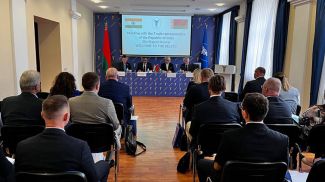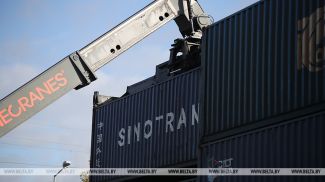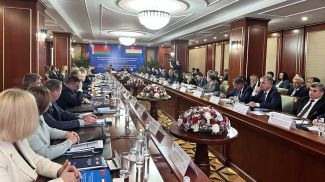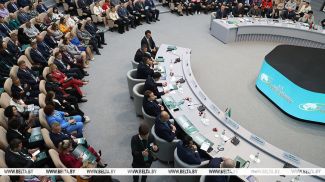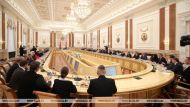MINSK, 11 December (BelTA) – Equipped as part of the European Union's project to assist Belarus with standardizing energy effectiveness parameters of consumer and industrial goods, nine labs were opened at premises of the Belarusian State Standardization and Certification Institute (BelGISS) on 11 December, BelTA has learned.
The nine upgraded labs will take care of testing 21 groups of commodities, including lighting products, refrigerating products, electric ovens, electric motors, external power supplies, for compliance with declared energy effectiveness parameters. In the past the labs could test the products only for compliance with electric safety and electromagnetic compatibility parameters.
Chairman of the State Standardization Committee Viktor Nazarenko said that about €3.5 million had been spent on acquiring the equipment and teaching personnel how to use it properly. About €0.5 million was spent on equipping energy effectiveness labs, with €1 million spent on working out the relevant standards. Apart from that, some 600 specialists in 80 organizations have been trained.
The Belarusian state standardization agencies initially intended to work out nine energy effectiveness standards but came up with 50 ones in the end. The standards are virtually identical to European ones. Thus, all the electric technology equipment Belarus imports will be checked for compliance with European requirements. The State Standardization Committee expects to continue this cooperation, noted Viktor Nazarenko.
Vassilis Maragos, head of the department for cooperation with Armenia, Azerbaijan, Belarus, and Eastern Partnership countries at the European Commission's Directorate-General for Neighborhood and Enlargement Negotiations, noted that the project was meant to bolster the competitive ability of the Belarusian economy and improve its energy effectiveness. “We would like consumers in Belarus to enjoy the same level of protection that consumers in the European Union do. Taking into account the globalized nature of trade improving the capability of the standardization institute to test equipment is becoming important. It will help create products, which are competitive on various markets. We enjoy a considerable level of trade with Belarus. We hope that the volume of trade will grow larger,” he said.
Vassilis Maragos also underlined: “We support Belarus' efforts to join the World Trade Organization. Increasing the potential of such labs and other institutions in Belarus will prepare the country for becoming a full-value participant of international trade. These tests will help sell Belarusian products on European markets.”




